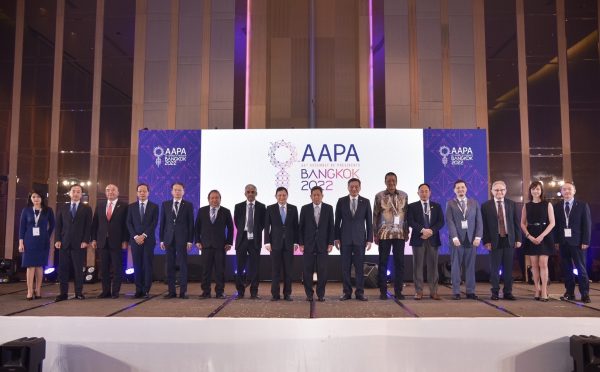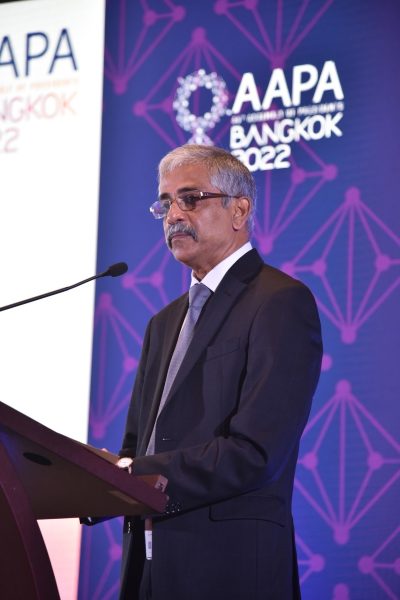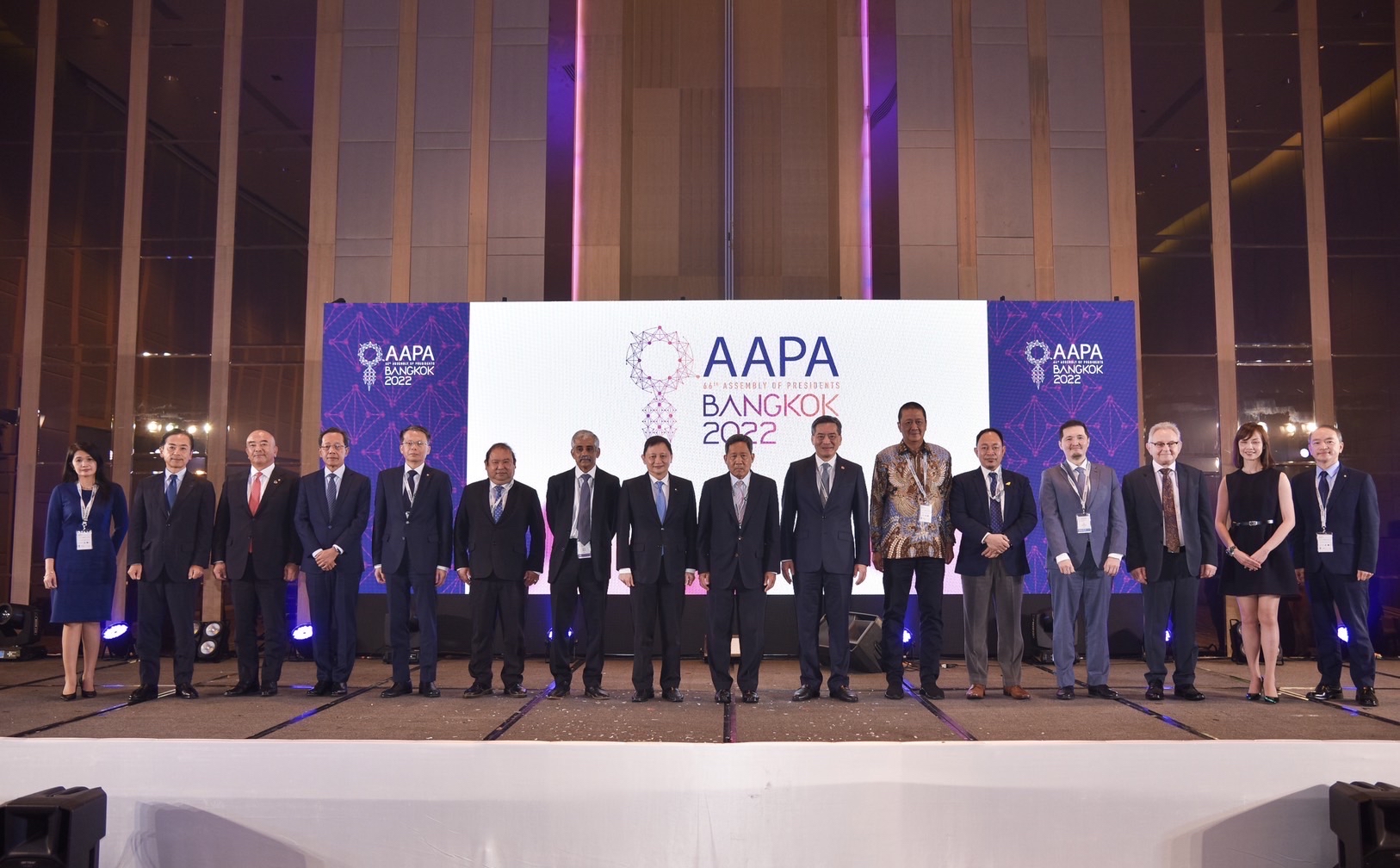BANGKOK, 14 November 2022: The reopening of borders and the recovery of air traffic supported by the strong tailwinds of pent-up demand for travel in the post-Covid-19 era are the drivers pushing air traffic recovery in the region, according to the Asia Pacific Airlines Association.
But AAPA warned that ramping up services to meet market demand may be slower than travellers’ expectations. AAPA noted the aviation industry is also buffeted by severe headwinds such as recruitment challenges, onerous regulations, supply chain disruption, and fuel supplies amid the backdrop of softening economic outlook.

Airline presidents gathering in Bangkok last week’s AAPA 66th Assembly of Presidents raised the issues calling for a coordinated approach from governments to ensure speedy recovery in the region’s aviation sector materialises in the coming months.
According to AAPA, from January to September, Asia Pacific airlines recorded a robust five-fold increase of 62 million international passengers compared to the same period in 2021. Consequently, with capacity expanding by 125% over the same period, the regional passenger load factor jumped by 40 percentage points to an average of 70%.
However, the recovery pace in the Asia Pacific region falls short of other areas, which are already seeing air traffic volumes close to 90% of the 2019 levels.

AAPA director general Subhas Menon said the critical factor slowing recovery in the Asia Pacific is China’s zero-Covid strategy that maintains border controls and travel restrictions.
“It bears repeating that the pandemic is not over. Many of us are still learning to live with it, but we can be hopeful that Asia Pacific air traffic volumes will recover to at least two-thirds of the 2019 levels by year-end. Full recovery may take another year, provided the global economic outlook doesn’t get any worse.”
He noted: “As much as the outlook for air travel looks bright, at least for now, there are signs that the global economic outlook may get bleaker and that the industry’s recovery coincides with a looming recession, will be a cause for concern.”
Overall, airline margins remain under pressure. Asia Pacific airlines still see operating margins at -16.4% in the first quarter of this year, but the figures show some improvement from -21.9% in the same period last year.
“Revenue side, yields are quite strong, but for the cost side, aviation faces strong headwinds. Costs are escalating, in particular, fuel costs. Plus, interest rate hikes by the US Federal Reserve boosting the dollar also affect the cost and diminish spending power.”
Menon said that the softening global economic outlook is happening in a tight job market, as employment rates are robust. Ironically, job vacancies in the aviation industry are at their highest.
“Manpower left the industry during the Covid-19. We need to get them back and train them. As air travel gradually recovers, airlines continue to invest in recruitment and training to address additional manpower needs.”
Limited capacity, growing expenses, and strong demand from a wide range of travel segments, including business, pleasure, and VFR (visiting friends and relatives), have increased ticket prices.
“Pricing reflects the inability of supply to catch up with the demand, but this will not continue forever. Sooner or later, the supply will catch up, and airlines will bring back their services. Fares will settle down.”
AAPA airline chiefs stressed the critical importance of governments adopting a more coordinated approach relating to Passenger Facilitation, Safety and Sustainability,
“AAPA carriers have shown great resilience in confronting the challenges brought about by the prolonged COVID-19 pandemic whilst maintaining the highest safety standards,” according to Menon. “However, the lack of coordination of travel requirements across borders, and the burden of restrictive government regulations, hold back the sustainable recovery and growth of Asia’s carriers, as well as their ability to fully contribute to the social and economic development of the region.”
Passenger Facilitation
AAPA calls on governments and border control agencies to work together in adopting interoperable digital applications for air travel, according to ICAO guidance, to reduce unnecessary pre-departure congestion, delays and inconvenience to the travelling public.
AAPA also calls on governments to use existing passenger data exchange systems to provide integrated pre-travel verification responses to aircraft operators related to immigration, security and public health requirements while fully respecting passenger privacy rights.
AAPA airlines are concerned about unilateral regulations introduced by national/regional aviation regulators, failing to consider the international nature of airline operations, such as unresolved spectrum issues relating to aeronautical safety services. AAPA calls on governments, aviation regulators, safety agencies and other stakeholders to support the ICAO frequency spectrum strategy. AAPA also calls on governments to consult with aviation safety regulators, subject matter experts and airspace users to provide all necessary considerations and to establish regulatory measures to ensure that incumbent aviation systems and services are free from harmful interference.
Meanwhile, for Sustainability, AAPA member carriers are fully committed to achieving the ambitious industry target of net zero carbon emissions by 2050. AAPA calls on governments to work with relevant stakeholders such as fuel suppliers to accelerate the fuel research, certification and development as well as processing technology and feedstock production, and the certification of new aircraft and engines to allow the scaling-up of SAF in sufficient quantities at a competitive cost to meet the long term needs of the industry. The Association also renews the call on governments to participate in the CORSIA scheme, to respect the scope and the integrity of CORSIA and refrain from applying duplicative requirements on international aviation CO2 emissions.







